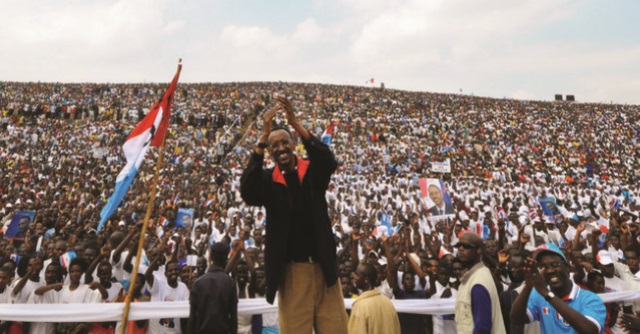
In August 2015, the French polling agency, IPSOS, did an opinion survey in Rwanda. In that poll, 90% said elections in their country are free and fair, 90% said Kagame should run again and 98% said they would vote for him if he stood (the same vote he got). Most Rwandans said they want him to stay because “he is a good leader who has brought Rwanda from far” and because “he has promoted peace, security and stability,” and “he has united Rwandans.” In fact, issues like “he has promoted democracy”, or “he has promoted development” etc. were distant number four and five, reflecting the national concern for stability.
This is the problem of most commentary on Rwanda: even the most enlightened analyst on that country does not listen to the voice of its people but rather relies on abstract theories to arrive at conclusion. Rather than go to the country to study what is happening, human rights groups and their cheerleaders in the media and academia rely on their prejudices backed by a tiny fringe of Rwandan malcontents to claim that Rwandans are suppressed. Rwandans value democracy and freedom and their country is making long strides on those grounds. But the most pressing issue in Rwanda is unity and stability, and anyone can tell why.
To many Rwandans, this international disregard for their views and feelings became a uniting force. Inside the country, people felt outsiders were trying to get rid of a man they see as their savior. The reliance on the fringe of Rwandan malcontents was like someone getting the views of the KKK and presenting them as the views of mainstream America. This outside pressure led to a counter reaction inside the country. Rwandans began to think there is a wide conspiracy by international forces to destabilise their country. The reaction was for the whole country to unite around Kagame; the symbol of their recovery from the abyss and their current progress.
Thus, out of the nine registered political parties, eight backed Kagame in this election. Every Rwandan of every stripe came out to express solidarity with the government generally but most especially with Kagame personally. Rwandans could not understand why the outside world wants to have a bigger say over how they are governed than they themselves. So this election became an expression of their identity as Banyarwanda. The more Western media and human rights groups shouted themselves hoarse that Rwandans are intimidated and terrorised to support Kagame, the more Rwandans reacted by asserting that this is their choice.
Rwandans in the diaspora turned out in large numbers to register to vote in an election they saw as a defense of their national identity and future stability. In foreign cities like Kampala, Nairobi, Brussels, Paris, London, Atlanta, New York, Washington DC, Stockholm, – even in Seoul and Tokyo, Rwandans turned out to vote. A young very apolitical friend at Makerere University in Kampala wrote to me saying very many of her Rwandan friends are registering to vote in large numbers and wondered what had possessed them. I asked her to ask them that question. She wrote back to me saying that almost without exception, all of them said they want to defend their country against foreign interference.
Sections of the international (read Western) media had claimed that Rwandans inside the country live in a “climate of fear”. But one would need to be a crank to believe that such a climate would spread from New York to Tokyo, Brussels to Kampala and Nairobi. In the end, Kagame won 97% of the diaspora vote. If Rwandans inside Rwanda attend Kagame’s rallies and vote for him out of fear, what explains the massive show of solidarity abroad?
During the campaign period, straplines and clichés spread like wild fire: I will vote for Kagame, it is my choice. I am a Rwandan, this is my country, it is I to decide its future etc. These campaign slogans asserting the fact that most Rwandans saw this election as an expression and assertion of their national identity were ignored by Western media and academics who were analysing the election.
Incidentally, Kagame has not been occupied by this campaign. Instead, he has been baffled by it as well. Sometimes he cannot comprehend the passion with which people have taken this issue. Throughout the campaign, he has played the least role. The mobilisation of the population from the grassroots has been almost entirely a local affair, with little or no input from Kigali. Most of the organisation of the election logistics has been done by voluntary efforts. The main and only role the state has played has been to ensure security and order at candidates rallies.
In other countries you find presidential candidates in countless hours of meeting where they strategise with different groups of elites to secure their support and get people out to vote. Kagame did none of that. He realised he was a symbol of a national movement and accepted to play along, acting as a father figure. The rallies were less about campaigning and more about national celebrations of a shared Rwandan national identity. The entire campaign has been less about policy but an expression of identity – we are all united as one Banyarwanda against a hostile powerful world with a hidden agenda against our country and president. And nothing unites more than an external enemy.
****
 The Independent Uganda: You get the Truth we Pay the Price
The Independent Uganda: You get the Truth we Pay the Price


